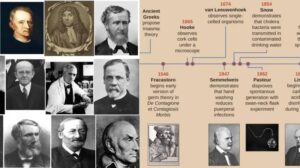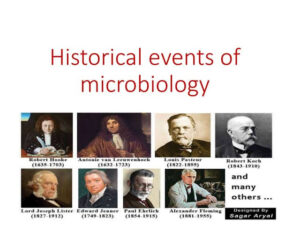Back to: MICROBIOLOGY 100 LEVEL
Welcome to class!
Hello superstar! I’m so glad you’re here again today. You’re showing real commitment, and that’s exactly what successful learners do. Today’s topic is like a storybook of heroes—but instead of capes and superpowers, these heroes used microscopes, experiments, and brilliant ideas to change the world. Let’s meet some of the most important figures in the history of microbiology and learn how their discoveries still affect our lives here in Nigeria and beyond.
Contributions Of Leeuwenhoek, Pasteur, Koch, Etc.
Anton van Leeuwenhoek – The First to See Microbes
Let’s begin with Anton van Leeuwenhoek, a Dutch fabric merchant in the 1600s. He wasn’t a scientist by profession, but he loved making lenses. One day, he looked at a drop of water under a microscope he built by hand and saw tiny creatures moving around. He called them animalcules—what we now know as microorganisms.

Think of it like this: when you fetch water from a stream in your village, it might look clean, but under a microscope, it can be full of bacteria and protozoa. Thanks to Leeuwenhoek’s discovery, we now know what’s really in that water!
Louis Pasteur – The Germ Fighter
Next is Louis Pasteur, a French scientist from the 1800s who gave us the “germ theory of disease.” Before Pasteur, many people believed that diseases just “appeared.” But Pasteur showed that tiny organisms—germs—caused illness.
He also invented pasteurisation, a process of heating liquids to kill harmful microbes. Thanks to him, we can enjoy safer milk, juice, and even kunu! He also developed vaccines, including one for rabies. Imagine how many lives have been saved because of that!
Robert Koch – The Disease Detective
Now meet Robert Koch, a German doctor and scientist. He was the first to prove that specific microbes cause specific diseases. For example, he showed that the bacterium Mycobacterium tuberculosis causes tuberculosis (TB), which is still a health concern in parts of Nigeria today.
Koch also developed special techniques to grow bacteria in the lab—like using agar plates—so scientists could study them better. His work helped doctors to diagnose and treat diseases properly.
Other Notable Contributors
Edward Jenner: Developed the first successful vaccine—for smallpox. This paved the way for the vaccines we take today.

Joseph Lister: Promoted antiseptics in surgery. Thanks to him, hospitals now use disinfectants and sterile tools.
Alexander Fleming: Discovered penicillin, the first true antibiotic. His discovery has saved millions of lives from bacterial infections.
Summary
- Leeuwenhoek was the first person to see microorganisms using a microscope.
- Pasteur proved that germs cause diseases and created pasteurisation and vaccines.
- Koch identified specific microbes that cause specific diseases and developed lab techniques.
- Other heroes like Jenner, Lister, and Fleming made life-saving contributions to vaccines, surgery, and antibiotics.
Evaluation
- Who first observed microorganisms and what did he call them?
- What is Louis Pasteur known for, and how does it affect our lives today?
- Which scientist proved that specific microbes cause specific diseases?
You’ve just learned about some of the greatest minds in science—minds that changed the world and saved millions of lives. Keep believing in yourself, because at Afrilearn, we believe in you too. See you in the next exciting lesson!
